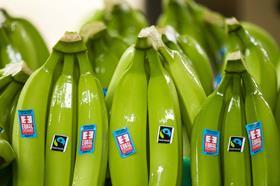
Speakers at a conference on Fairtrade have criticised the proliferation of other in-house ethical labels for confusing consumers and “falling short” on standards.
During the event at the Crystal in East London, Michael Fletcher, retail chief commercial officer at Co-op, stressed that Fairtrade is the “gold standard of ethical labels”, adding that anything else “falls short”.
Fletcher appeared to indirectly criticise its rival Sainsbury’s, whichreplaced the Fairtrade mark on its own-brand tea last year with a pilot version called “Fairly Traded”.
Sainsbury’s claims farmers receive “above and beyond” what they were receiving under the Fairtrade scheme.However, Fletcher called on retailers and brands toend “the proliferation of ethical labels”.
“Consumers aren’t aware of the issues that exist,” he said. “Those that are find it difficult to make informed choices due to the varying schemes which retailers and brands support, with the most vulnerable in our food chain paying the greatest price for this confusion.
“There’s clearly more work to be done in helping everyone understand exactly what Fairtrade stands for. That means ending the proliferation of ethical labels and putting our full weight behind a conversation about global fairness.”
The Fairtrade Foundation’s new chair of trustees, and former chief executive of Waitrose, Lord Mark Price, added that while Fairtrade is open to working with business in new ways, official Fairtrade certification will always remain at the heart of the organisation.
He said that products carrying the Fairtrade mark will continue to enjoy a higher level of trust and recognition than any other ethical label.
Aside from this issue, speakers at the conference, entitled ‘The Future of Trade: Can it work for everyone?’, called for a fundamental shift in consumers’ understanding of the lives of farmers and producers in the developing world.
Fletcher addressed the true impacts of unfair trade and the harm this is causing to communities around the world, encouraging the public to see this in the same way that Blue Planet showed the impact of plastic on the world’s oceans.
Other speakers, including the Fairtrade Foundation’s chief executive Michael Gidney, agreed that consumers needed to have their eyes opened to the plight of the farmers and workers who toil to make the products, such as coffee, bananas and tea, which we take for granted.
“Fairtrade is nearly 25-years-old and in that time we have made great strides in improving the lives of millions of farmers and producers across the developing world,” Gidney said. “However, we know that much more needs to be done.
“Issues like gender inequality, child labour, modern slavery and climate change are entrenched in a global system of trade that is still rigged against farmers and workers. To tackle these challenges we must work together.”
The conference brought together Fairtrade supporters, producers, commercial partners and NGOs to discuss critical topics such as gender equality in global trade, the future of transparency in supply chains, climate change adaptation and how to achieve living incomes for producers.
Delegates heard from Fairtrade producers and farmers who spoke passionately about the impact of Fairtrade. Xiomara Paredes, executive director of the Latin American and Caribbean Network of Fair Trade Small Producers and Workers, emphasised the importance of farmers being able to access a stable market through Fairtrade. She said:“Fairtrade brings huge benefit for producers. I see every day the changes Fairtrade makes in the lives of farmers.”
Ahead of a panel discussion on gender equality, Paredes also spoke about the importance of empowering women in the Fairtrade system:“Fairtrade is enabling women to participate in decisions, there are national platforms, boards they are part of and they have greater visibility. It is empowering when you are able to make your own decisions, you decide your destiny,”she said.
The event also saw Fairtrade present a range of innovative new ways of working with businesses to complement traditional certification.Companies are now able to work with Fairtrade on bespoke programmatic work or gain a better understanding of their supply chains.
According to the Foundation, support for Fairtrade has never been stronger. Fairtrade sales in the UK grew by seven per cent in 2017, while the international market has grown by 15 per cent every year for the last 30 years. Meanwhile 91 per cent of consumers in the UK are aware of the Fairtrade mark, with 80 per cent saying they trust it.



